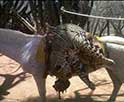Dead Fish in Lake Chapala: Causes and Impact
Environmental Concerns: Dead Fish in Lake Chapala
Reading time : 1 minute,
Discovery Chepe Id-728-ECO
Published in
05-30-2025

Photo: La Jornada Online.
The shores of Lake Chapala were covered yesterday with an unsettling sight: hundreds of dead fish floating lifelessly in the water. This alarming event has once again drawn attention to the environmental challenges faced by Mexico's largest freshwater lake.
What Happened?
On the morning of May 29, residents and fishermen of the lakeside towns, particularly in the areas of Jocotepec and Ajijic, reported the appearance of dead fish along the coastline. The phenomenon, while not entirely new, has generated growing concern due to its frequency and scale.
Possible Causes
Experts point to several reasons behind the mass fish deaths:
1- Low oxygen levels: During hot seasons, the oxygen levels in the lake tend to decrease significantly, especially in the early morning hours. This often leads to hypoxic conditions that can be fatal for aquatic life.
2- Algae blooms: Excessive nutrients in the water, particularly nitrogen and phosphorus, often caused by untreated sewage and agricultural runoff, can lead to harmful algae blooms that suffocate fish.
3- Contaminants: According to environmentalists, pollution from industrial discharges and garbage dumping remains a severe issue. Tests conducted in previous years have revealed high levels of heavy metals and bacteria in some sectors of the lake.
4- Sudden temperature changes: Abrupt shifts in temperature may also cause stress or shock in fish, reducing their chances of survival.

Lake Chapala Fish Die-Off: What's Happening?
Photo: La Jornada Online.
How Often Does This Happen?
This isn't the first time such an incident has occurred. Mass fish deaths have been documented multiple times in the last decade, often during the dry season. According to a report by Mexico's Environment Ministry (SEMARNAT), similar events were recorded in 2015, 2019, and 2022.
The Environmental Consequences
The death of so many fish disrupts the ecological balance of the lake. Scavenger species and birds lose a food source, and the decomposition of the fish can increase bacteria and toxins in the water. Additionally, the local population that depends on the lake for fishing and tourism faces serious economic and health risks.
Voices from the Shore
Local fishermen are among the most affected. Don Manuel, a 58-year-old who has fished the lake for over three decades, said:
"Every year it's worse. The fish are fewer, the smell is unbearable, and people stop buying from us because they're afraid."
Other fishermen claim that despite repeated complaints to authorities, little is being done to control pollution or enforce environmental protections. Many feel abandoned by the government and forced to adapt to a deteriorating environment.
What Can Be Done?
Several environmental groups and local NGOs are pushing for stronger regulations and cleanup initiatives. Some key proposals include:
a) Upgrading sewage treatment plants: To prevent untreated waste from entering the lake.
b) Promoting sustainable agriculture: Reducing the use of fertilizers and chemicals in nearby farmlands.
c) Establishing conservation zones: To allow the lake's ecosystems to recover.
d) Raising public awareness: Through education and community participation in lake protection.
Where to Learn More
For those interested in following the updates or supporting conservation efforts, the following links offer reliable information:
WWF Mexico - Lake Chapala Conservation
Jalisco Environment and Territorial Development Secretariat
Final Thoughts
Lake Chapala is more than a scenic landscape it's a source of life for thousands. Its decline reflects broader environmental issues that affect us all. As one local activist put it, "If the lake dies, so does a part of our identity."
?? Habitantes de Ajijic reportan aparición de peces muertos en la orilla del Lago de Chapala. Piden a autoridades investigar posible causa ambiental. ??#Chapala #Ajijic #MedioAmbiente pic.twitter.com/wScwzHx8dt
— LA VOZ DE LA RIBERA (@LAVOZDELARIBER1) May 27, 2025
See Also
Discovery Chepe
Most read...















